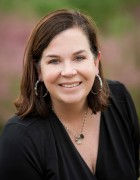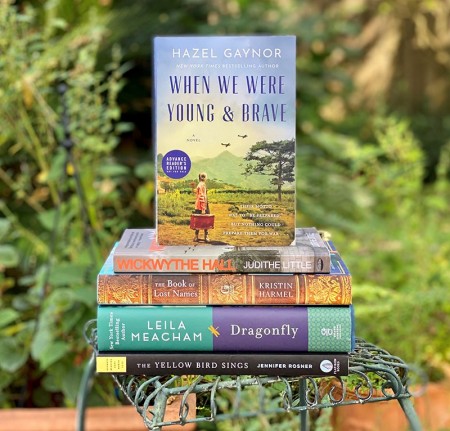Historical Fiction Set during WWII

The historical fiction genre is flourishing and furnishes readers with an escape from our current crazy world while providing a glimpse into a different time period in history. The entire genre is booming, and novels set during World War II are particularly popular; there are still so many stories to be told. This week I am highlighting some of my favorites.
These are 12 historical fiction books set during World War II that are true standouts in the genre:
The Baker’s Secret by Stephen P. Kiernan - The Baker’s Secret takes place in Le Verger, a French town on the Normandy coast, on the eve of D-Day. The town is occupied by the Nazis who have beaten down the townspeople with countless acts of cruelty including rationing food to the point that everyone is slowly starving. Kiernan tells the tale of the courageous baker Emmanuelle and her fellow villagers who worked to defy the Nazis in their own subtle ways. The Baker’s Secret is a tear-jerker (have plenty of tissues handy), but the book’s message is one of optimism and the ability of humans to overcome even the most tragic circumstances.
The Book of Lost Names by Kristin Harmel - Harmel’s latest novel chronicles the story of a skilled forger who risks her life during World War II to help hundreds of Jewish children escape the Nazis. To ensure that the children’s original identities will not be permanently erased, Eva and a fellow forger create a coded system to secretly preserve the real names and identities of the escapees. Decades later, the code is discovered but cannot be decoded, and Eva must decide if she has the strength to revisit the past. Harmel highlights the roles forgers played in the Resistance effort and the lives they saved as a result. Listen to her podcast interview here.
The Book Thief by Markus Zusak - Told from the unique perspective of Death, The Book Thief is a stunning and evocative masterpiece. Zusak’s characters are courageous and authentic and his story focuses on everyday people enduring Nazi rule in a small town outside of Munich, the power of books and the written word. Frequently chilling and often heartbreaking, the novel does not shy away from describing the horrors of war; however, it ultimately champions the human spirit and its refusal to be cowed by evil. The Book Thief is a tale that will not soon be forgotten, and it remains one of the best books I have ever read.
The Chilbury Ladies’ Choir by Jennifer Ryan - Jennifer Ryan tells her story in an epistolary format using a series of journal entries and letters, a method that is very effective for this novel. Chilbury is a fictional small town in England close to the eastern coast. As the story opens in 1941, most of the men have left to fight in the war causing the vicar of the local church to disband the choir until the war has concluded. A group of women, led by a spirited newcomer, rebel against the vicar’s wishes and create the Chilbury Ladies’ Choir. The effect of the choir on Chilbury and several neighboring towns is immense, and the book contains both hilarious and heartbreaking storylines. The Chilbury Ladies’ Choir includes countless valuable sentiments and statements about both the war and life in general, and the book and its characters have stayed with me several years after I finished reading it.
Dear Mrs. Bird by A.J. Pearce - As the book opens in 1940s London, Emmy Lake arrives for a newspaper interview thinking the position is for a lady war correspondent when instead the position is to sort through letters written to a Dear Abby type named Mrs. Bird. She is hired and, unhappy with Mrs. Bird’s opinions on many of the letters she receives (and Mrs. Bird’s refusal to answer any that she deems unpleasant), Emmy decides to secretly answer some of the truly desperate letters. While it might sound like a light read, the story is thought-provoking, occasionally heart-wrenching and simply superb. Pearce’s descriptions of blitzed and war-torn London are so vivid that at times readers will find themselves in London with Emmy and her friends. The plot is creative and original and Dear Mrs. Bird is a great addition to this sub-genre.
Dragonfly by Leila Meacham - Leila Meacham’s incredible World War II saga chronicles a fictional team of young Americans recruited as OSS agents to infiltrate Nazi-occupied Paris. The team is code-named Dragonfly, and upon arrival in Paris, the group disperses and sets about to fulfill their unique missions while also pursuing their own individual agendas. The genius of Dragonfly is Meacham’s ability to vividly portray German-occupied Paris and the treachery that constantly existed for those working to thwart Hitler and the Nazis. Her novel frequently proves the maxim “the best laid plans of mice and men often go awry” as each agent must quickly and intelligently adjust to the challenges and unexpected issues that regularly arise. Clever, suspenseful and character-driven, Dragonfly is a tour-de-force and a fabulous addition to this genre.
The Lost Letter by Jillian Cantor - Jillian Cantor fashions an intriguing and fascinating tale of resistance to the Nazis while highlighting the innovative ways resistance workers used to evacuate Jews from Austria. Inspired by actual events, The Lost Letter focuses on stamp engravers who helped the Austrian Resistance by sending covert messages in stamp designs and forging papers for Jews trying to leave the country. Cantor uses a dual timeline format, World War II and the present, and ties them together splendidly and seamlessly. The Lost Letter is a simply fabulous and stunning read.
The Lost Vintage by Ann Mah - The Lost Vintage is a beautifully crafted tale focusing on the French Resistance during and after the war. In the present-day tale, Kate is studying to pass the Master of Wine Examination and travels to her family’s estate in Burgundy to attempt to master the Burgundian vintages. While there, she uncovers a hidden room filled with World War II resistance pamphlets and a vast amount of valuable wine. Spurred on by her discovery, Kate delves into her family’s past and uncovers a great aunt named Helene who was expunged from the family history because she had been labeled a collaborator following the war. Mah’s novel addresses the way the French dealt with collaborators, particularly women, following the war and the way these women were treated once denounced as collaborators (with or without evidence).
Universe of Two by Stephen Kiernan – Universe of Two is the fictionalized story of Charlie Fisk, the man who designed and constructed the detonator for the atomic bomb. Recruited to work on the top-secret Manhattan Project, Fisk was ordered to create the detonator against his own beliefs, and when he had a crisis of conscience, his wife, not privy to the details of the project, encouraged him to finish up his work on the project. Following the detonation of the bombs on Japan, he and his wife spend their post-war years attempting to make amends for his contribution to the devastation wreaked on Japan. Kiernan brings Fisk to life in a heartfelt and fitting tribute that ponders the true costs of war. Listen to his podcast interview here.
When We Were Young & Brave by Hazel Gaynor - In this compelling novel, Gaynor brings to life the story of a group of teachers and students at a British-operated missionary school in Chefoo, China. Inspired by a true story, When We Were Young & Brave chronicles this group’s experience as captives of the occupying Japanese army during World War II. When Japan declared war on Britain and the United States, the Japanese forces took control of the Chefoo School and its inhabitants and eventually moved the group to a Japanese internment camp, requiring the teachers to help their students weather unimaginable adversity. Gaynor vividly portrays the horrors of war, life in captivity, the resilience and optimism of humans, and the importance of relationships. Listen to her podcast interview here.
Wickwythe Hall by Judithe Little - Judithe Little has a way with words, and readers will quickly be drawn into Wickwythe Hall. Little covers a wide range of aspects of the war deftly, and her writing is so descriptive that readers will feel as if they are waiting on the dock in Dunkirk as the soldiers arrived, walking with the French people as they fled German-occupied France, and fleeing Mers el-Kebir, Algeria as the British bombed the French ships during Operation Catapult. I was fascinated to learn about the bombing of French ships by the British during World War II, a little-known event today that demonstrates the complexity and horrors of war.
The Yellow Bird Sings by Jennifer Rosner - During World War II in Poland, a Jewish mother and her musical prodigy daughter hide in a neighbor’s barn as Nazis round up the Jews in their town. Anxious to keep her young daughter Shira quiet and safe, Roza tells her a story about a girl who lives in an enchanted garden. The girl is not allowed to make any noise so instead, a yellow bird sings: the bird sings whatever the girl composes in her head. While the enchanted tale keeps Shira safe initially, the Germans decide to use the barn where they are hiding, and Roza is forced to make a choice no mother should have to make.
I would love to hear your favorite World War II stories. Feel free to drop them in the comments!
For more book recommendations and bookish thoughts, see Cindy’s monthly Buzz Reads column, her Thoughts from a Page Podcast or follow @ThoughtsFromaPage on Instagram. Find upcoming Conversations from a Page events here.
Want more buzz like this? Sign up for our Morning Buzz emails.
To leave a comment, please log in or create an account with The Buzz Magazines, Disqus, Facebook, or Twitter. Or you may post as a guest.



